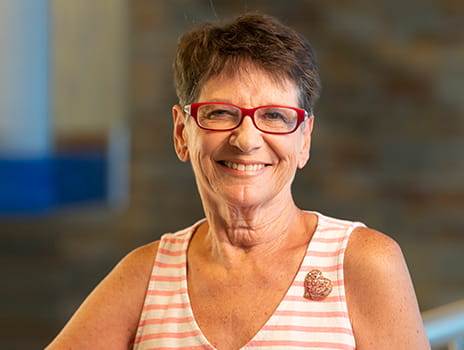- Home
- News Room
- Patient Stories
- Active Retiree Tackles Brain Tumor, Eye Melanoma in 1-2 Punch
June 19, 2019
At 72, Susan Hunnicutt was thoroughly enjoying retirement, spending plenty of time outdoors on her idyllic 2 acres and tending to 25 free-standing gardens across her property in Belton, Missouri. When she began feeling unbalanced and dizzy on a regular basis, she knew something wasn’t right.
After visiting her doctor, Susan was diagnosed with atrial fibrillation (AFib) – an irregular heartbeat – and underwent a surgical procedure to correct the problem. But she still felt unsteady and “off,” so she returned to her physician.
Over the course of several months, she saw a number of doctors and specialists in search of answers to her worsening symptoms. Not only was her balance off, she was frequently belching and food tasted terrible. She had no appetite and lost 20 pounds.
“When I coughed, it felt like something was stabbing me in the head, and my teeth were incredibly sensitive,” says Susan. “My handwriting became horrible, and I was tired all the time. I slept constantly.”
Finally, Susan was referred to an ophthalmologist who discovered cancer cells in Susan’s eye. A full MRI was ordered, and Susan was referred to The University of Kansas Cancer Center, where a radiation oncologist determined Susan was also dealing with a sizable brain tumor. It fortunately was not cancerous, but was still causing significant problems. Hematologist/oncologist Gregory Crane, MD, contacted Susan with these results.
“He told me I had a benign brain tumor and sent me to the neurosurgeon, who saw me on Christmas Eve,” says Susan.
Mapping the right treatment plan
Susan had surgery to remove the brain tumor less than a month later.
She had a significant right cerebellar meningioma, which is a noncancerous tumor, but the size of the tumor was causing compression on vital brain tissue, leading to her symptoms.
Meningiomas are common and typically slow-growing tumors. The brain can accommodate to a point, but if the growth continues, eventually the patient will have symptoms.
People may think the symptoms are due to aging or a medication side effect, when in reality the tumor is the cause. This type of tumor does not always require surgery. Treatment is based on the patient’s age, size of the tumor, comorbidities and pressure on the brain. In Susan’s case, her care team’s evaluation pointed to surgery.
Susan’s surgery went well. Her surgical team removed a tumor the size of 2 golf balls, and most of her symptoms disappeared within a week.
Multidisciplinary approach elevates quality of care
With the brain tumor successfully treated, Susan turned her focus to treatment for the cancer in her eye. The collaboration among her care providers both within and outside The University of Kansas Health System created a fully informed and seamless treatment process.
Here, she had the advantage of getting treatment from an entire team who discussed the pathologies and determined the best path of care. The team communicated directly with one another and with the multidisciplinary tumor board. This gathering of specialists works together to plan treatment options for each patient.
“I’m very pleased with the care I’ve received. My surgeon always took time to listen to me,” says Susan. “If I have a question, I call and ask. The team is very responsive and calls quickly with an answer.”
Any time brain tumors occur, even benign ones, patients require continued follow-up care to ensure the tumors don’t return. Though Susan is almost symptom-free today, she’ll continue to have regularly scheduled MRI scans and doctor visits.
Susan credits the great care from her care team and the community of support and prayer she found over the course of her journey. She documented her experience on Facebook and had friends across the country following her story.
“My handwriting is becoming readable again, and I’m feeling good,” says Susan. “My appetite is back and I’m physically active again.”
With this critical step in her health journey behind her, she’s moving forward with her eye therapy with determination and optimism.
Patient testimonial: As with all treatments, individual patient results vary. It is important to discuss your treatment options with your healthcare provider.





